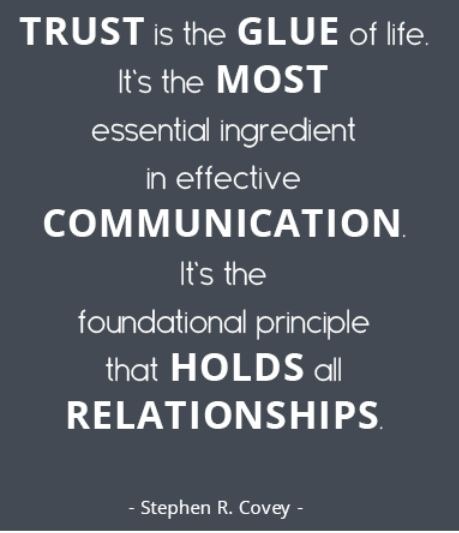

The need for trust in the workplace is a fundamental building block of any organization and can be regarded as so important that trust in the workplace either makes or breaks an organization’s culture.
Trust increases loyalty and the willingness to stay with a company. Trust decreases stress levels and hostility in the work environment. Trust overcomes resistance to change. Trust breaks down corporate silos and isolating behaviors. Earning employees’ trust is a key component to being a successful leader.
Leadership guru, Simon Sinek shares the value of employees knowing that their leaders are willing to look out for them. Leaders who aim to raise their status simply so they can enjoy the perks themselves are not fulfilling their role as leaders.
If you have ever worked in a place where trust was absent you will understand the stress and tension it causes. Nothing is worse than going to work each day and feeling like you have to constantly look over your shoulder for fear of losing your job, or having a colleague take credit for a project that you worked together on. In contrast, it is very liberating to be able to go to work and know that you are trusted, you will have a lighter step and be motivated to give your best. Remember that each person in the organization has a role to play, and they bring valuable talents and skills.
Trust comes from accepting a person for who they are and appreciating their uniqueness rather than asking them (or expecting them) to be someone else. The common language of trust comes from understanding people on a deep level. As a manager, exploring ways to put that language into action is what can build a workplace of trust. 99% of employees think trust in the workplace is a vital need at work.
Building Trust in the Workplace:
- Tell the truth.
- Avoid lying or shifting the blame.
- Understand how employees think.
- Understand how your behavior as a manager impacts the team.
Trust must be reciprocal, one-way trust is not beneficial to anyone. Leaders need to trust their people will make good decisions. This starts with proper training. Employees need to trust their leaders that they have the best interest of the people first. When company cultures are built upon an appreciation of the people, extraordinary things will happen.
If a workplace can foster a strong sense of trust within their organization, they can see several benefits including:
- Increased productivity amongst staff.
- Improved morale amongst employees and staff.
- Builds teamwork and collaboration.
- Empowers ethical decision-making.
- Increases loyalty and longevity.
- Decreases resistance to change and breaks down silos.
- Encourages sharing and developing ideas.
As a leader ask yourself:
- Am I listening to my employees and seeking their ideas, suggestions, and opinions?
- Am I open to employee ideas and including those ideas in the decision-making process?
- Am I setting and communicating consistent expectations regarding team and individual performance objectives?
- Do I tell employees the truth and follow through by doing what I say I am going to do, even when it is difficult?
- Am I treating everyone with the same dignity and respect that I expect and would like to receive, without revealing bias, judgment or personal favoritism?
- Are my own career goals or a personal agenda interfering with my team’s performance and my commitment to my employees’ success?
- Do I demonstrate concern and caring for each employee, work group, and department?
- Do I set a good example and conduct myself in a manner consistent with the mission, vision, and values of the organization?

Stephen Covey said: Trust is the glue of life. It’s the most essential ingredient in effective communication. It’s the foundational principle that holds all relationships.
Cheryl Viola, MBA, Executive Director
References
Miller, M. (2015, August 20). Trust in the workplace: Begin with a common language. Retrieved from https://www.emergenetics.com/blog/trust-in-the-workplace/
Sinek, S. (2017). Leaders eat last: Why some teams pull together and others don’t. Penguin.
Towers, P. (2019, February 24). Workplace trust: Why trust is important in the workplace.
Why trust matters in the workplace | Insightlink communications. (n.d.). Retrieved from https://www.insightlink.com/why-trust-matters-in-the-workplace.html

